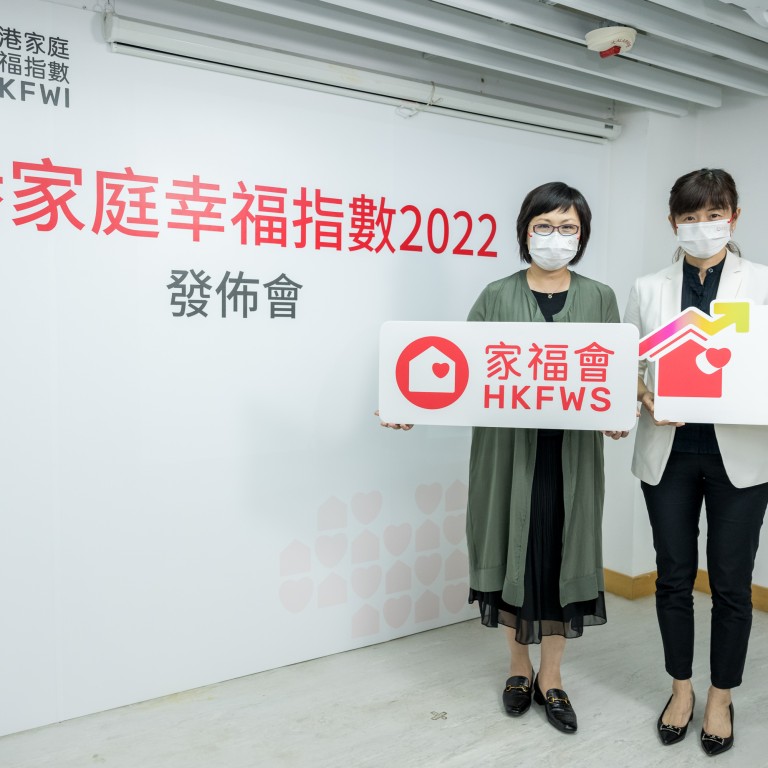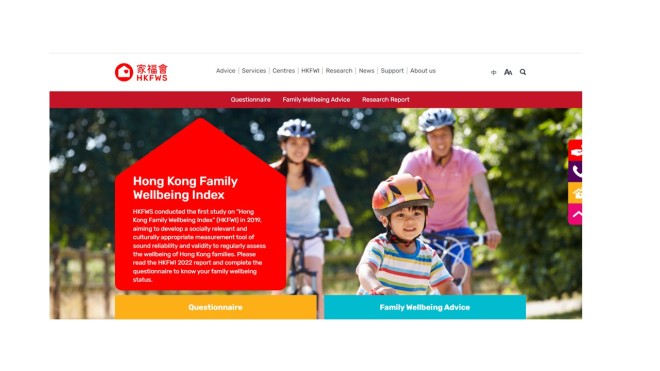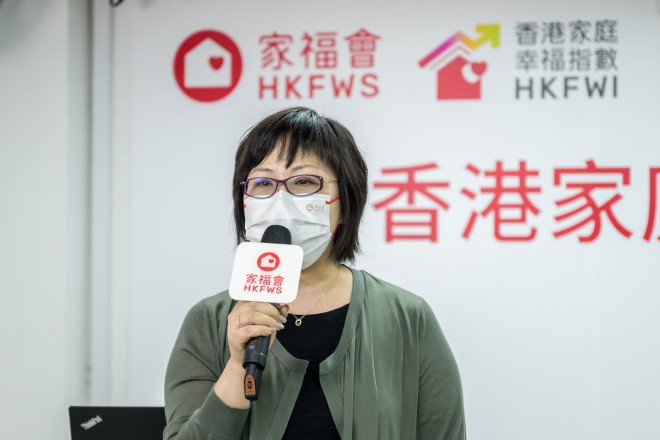
Decline in overall HKFWI score, Hong Kong Family Welfare Society calls for different sectors to collaborate to improve Hong Kong’s overall family wellbeing
Hong Kong Family Welfare Society (HKFWS) is committed to enhancing family wellbeing. The Society conducted the first study on “Hong Kong Family Wellbeing Index” (HKFWI) in 2019, aiming to develop a socially relevant and culturally appropriate measurement tool of sound reliability and validity to regularly assess the wellbeing of Hong Kong families. The Hong Kong Family Wellbeing Index (HKFWI) 2022 was conducted in January 2022 with a total of over 2,000 respondents. The main objective was to assess the latest wellbeing status of Hong Kong families in 2022 and to make comparisons with the previous results. The study also helped to gauge the impact of the COVID-19 pandemic on family income and family relationships.
[Sponsored Article]
The analysis of data from the HKFWI studies conducted in 2019 and 2022 highlights a strong correlation between the income of a family and its wellbeing. While the wellbeing of most local families has declined significantly in 2022 compared with 2019, low-income ones have suffered the most severe impact.
The study results were based on the trailblazing HKFWI developed by the Society which collected data through fix-line and mobile phone interviews with respondents. They answered the HKFWI questionnaire consisting of 26 questions covering six domains: family solidarity; family resources; family health; social connection; social resources; and work-life balance. The overall HKFWI score ranges from 0 to 10. The higher the score is, the better the family's wellbeing.

Ms Amarantha Yip, Chief Executive of HKFWS, said it has been the Society’s work approach of engaging the community and fostering partnerships to co-create, pass on and advocate family values, so as to build a caring society with family wellbeing as the core.
“Family wellbeing is a multidisciplinary concern deserving attention across different sectors and professions. The HKFWI is a reliable tool to be applied regularly and continuously for tracing the trend of Hong Kong family wellbeing. It helps to provide implications and insight on services and policy formulation to support the social and welfare development of our society,” she said.

Hong Kong Family Wellbeing Index 2022 key findings
Among the key findings in the 2022 HKFWI study is that the overall wellbeing of Hong Kong families deteriorated over the past two years, falling 0.21 to 6.10 (average) in 2022 from 6.31 in 2019. The decline was caused by the weakening of two external areas. They are: “social connection” (-0.86), which refers to the connection and interaction of a family with the social environment, including participation in social affairs and contribution to society; and “social resources” (-0.47), which refers to the availability and accessibility of formal or informal support a family in need can obtain, including through the government, friends and relatives.
The score of “social connection” was (3.26, poor) and that of “social resources” was (4.80, poor). These results are attributed to the pandemic-related social distancing measures. They have led to the isolation of many families and put a dent in their support network of relatives, friends and neighbours. On the bright side, families seemed to do well in the internal areas, namely “family solidarity” (7.40), “family resources” (7.20) and “family health” (7.07). Meanwhile, the share of families scoring “average” in their wellbeing declined to 43 percent in 2022, from 50 percent in 2019. The share of families scoring “poor” was 19 percent in 2022, representing a 7-percent increase.
The pandemic has further deepened the plight of many low-income families. While the family wellbeing has trended downward for most families when compared with 2019, low-income families have experienced the biggest blow. The HKFWI study has revealed that “the poor are getting poorer” because of the severe economic impact on many low-income families. Both the 2019 and 2022 studies have identified the strong correlation between family income and family wellbeing. The disparity in family income has increased, so has the disparity in family wellbeing.
In terms of the specific impact of COVID-19, 19 percent of the respondents said the pandemic had adversely affected their family relationships; and 66 percent said the pandemic had not affected their family relationships. In terms of economic impact, 50 percent said their family incomes went down because of the pandemic; and 47 percent said it did not affect their family incomes.
Teresa Cheung, Senior Manager of HKFWS, said: “To address the needs of low-income families, we should not only focus on poverty alleviation and provision of resources, but also work on improving family wellbeing to optimise the results, such as by strengthening their family functions.”
Different sectors to collaborate and co-create to enhance Hong Kong’s overall family wellbeing
Not only are the HKFWI study findings helpful for government departments to formulate more targeted policies and services to enhance family wellbeing, they also raise public awareness of issues affecting the overall family wellbeing status. The recognition of the issues may encourage some families in need to seek professional assistance.
HKFWS believes the betterment of family wellbeing can be approached within the family as well as through interaction with the society. It advocates the “family care partners” concept and encourages members of the “family team”, either living together or not, share the responsibility of looking after family members in need. The Society is also committed to promoting cross-generational communication and bonding, grandparents and parents collaborating to raise children together, and co-parenting by divorced couples, said Cheung.
Interaction and connection with organisations and individuals outside the family are essential, particularly for low-income families. HKFWS suggests closer collaboration between the government, the business community and the general public. “The government may deploy more resources to convene and coordinate the efforts by different organisations within the same district as part of a diverse support platform,” Cheung said. “As for business community, the connection between the property management companies and social welfare organisations can be strengthened. Additional training can be provided to property management employees so that they can help detect issues of families in need early and refer them to social workers.”
HKFWS also advocates the return of “neighbours’ mutual support”. “We found that the mutual support and help between neighbours made a significant positive impact during the pandemic’s fifth wave,” Cheung said. “Volunteer services contribute to this support. When family members participate in volunteer work together, it not only helps strengthen community networks, but also enhances family solidarity.”
